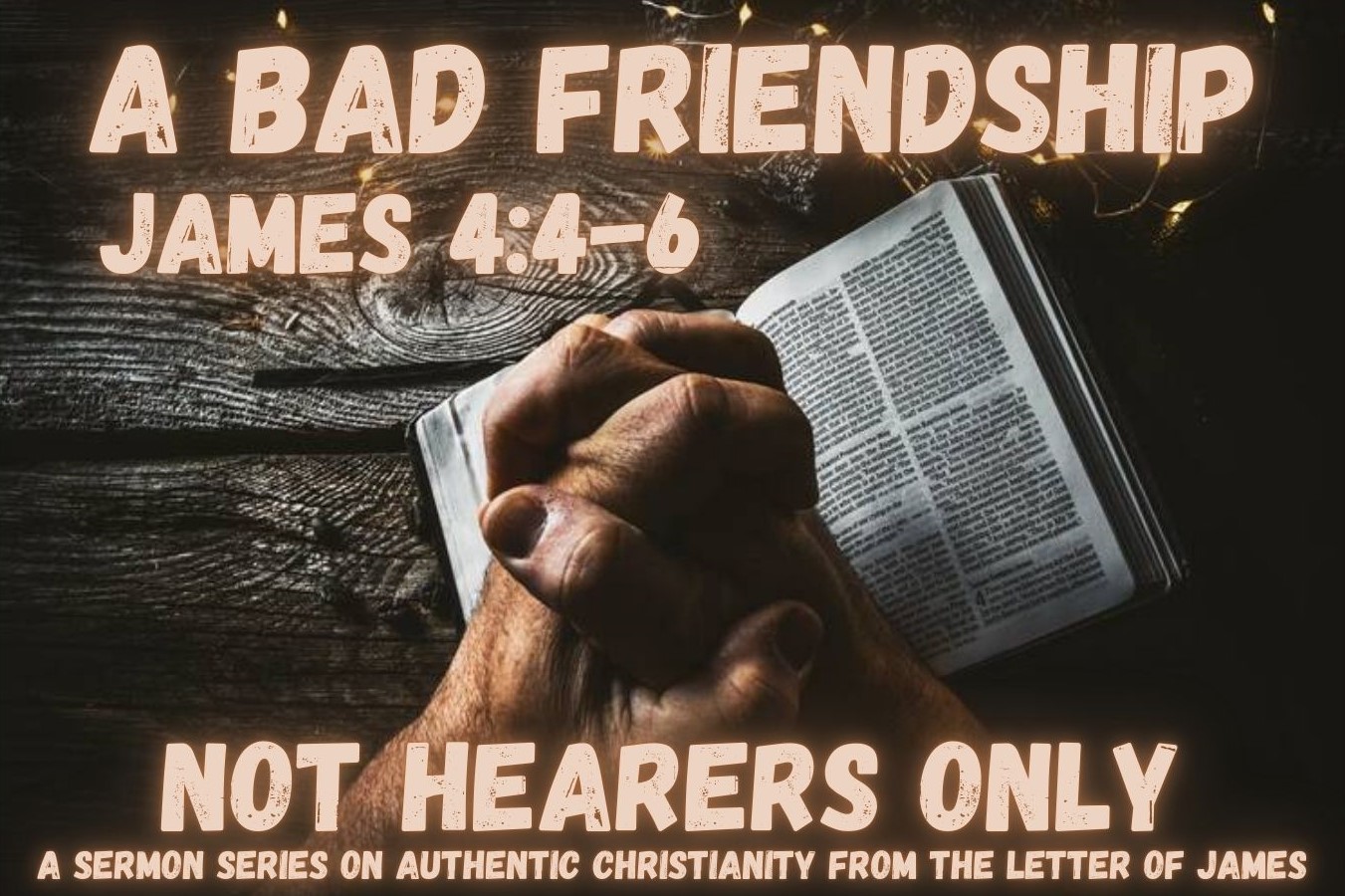James 4:4-6
4 Ye adulterers and adulteresses, know ye not that the friendship of the world is enmity with God? whosoever therefore will be a friend of the world is the enemy of God. 5 Do ye think that the scripture saith in vain, The spirit that dwelleth in us lusteth to envy? 6 But he giveth more grace. Wherefore he saith, God resisteth the proud, but giveth grace unto the humble.
What comes to your mind when you think about worldliness? Our minds probably run to certain shows we shouldn’t watch, music we shouldn’t listen to, places we shouldn’t go, and things we shouldn’t like to do. While those may be accurate, the essence of worldliness is a mindset that manifests itself in all sorts of ways. James would define worldliness as jealousy and selfish ambition that summarizes the essence of the wisdom of this world (James 3:14). In James 4:4-6 he addresses “the friendship of the world.” What does it mean to “be a friend of the world” and how does that make one an “enemy of God?” The concept of friendship is much more intense than in our present culture. Friendship implied a faithful alliance with someone. It implied serious fellowship and commitment to someone else. In these three verses, James defines for us what “friendship of the world” means and three reasons as to why this mindset is “enmity (hostility) with God?”
First, when we choose the world, we are rejecting the will of God. James pulls out some strong language calling those guilty of worldly thinking and fighting in the church “adulterers and adulteresses.” The language would immediately resonate with these Jewish believers because, throughout the Old Testament, God likens His relationship to Israel as that of a husband and an unfaithful wife (Jeremiah 3:20; Psalm 73:27; Ezekiel 16:32; Hosea 1:2). The entire book of Hosea is about the prophet Hosea being commanded twice to marry a harlot named Gomer as an object lesson for the people of Israel and how they had been unfaithful to God. The unfaithfulness exhibited here is that those James is writing to have chosen self (worldliness) over God. This naturally puts them at “enmity with God” and makes them an “enemy of God.” Selfishness is always at odds with God. James is simply telling us that we cannot desire and fulfill our sinful will and God’s will at the same time (Matthew 6:24). When we choose those selfish desires instead of God’s will we are putting ourselves at odds with God and His will. We naturally find ourselves working against God.
Next, when we choose the world, we are rejecting the Word of God. James pulls what appears to be a quote from the Old Testament. The issue arises in that the exact statement “The spirit that dwelleth in us lusteth to envy” does not appear anywhere in the Old Testament. Instead, it seems that what James is doing is presenting a concept that is taught throughout the Old Testament in summary form rather than quoting directly from a specific passage. Much debate arises over what “spirit” performs the lusting “to envy” here. We essentially have two options. First, it could refer to the spirit of a person who pursues and desires sinful things in opposition to God (Genesis 6:5; Proverbs 21:10; Jeremiah 17:9). Mankind is revealed as sinful through and through in the Old Testament. Second, it more likely refers to the Spirit of God in us that desires our total commitment to God. It would essentially mean then that God jealously desires us to be committed and obedient to Him. Throughout the Old Testament, God describes Himself as a jealous God (Exodus 20:5; Deuteronomy 4:24; Joshua 24:19; Isaiah 26:11; Ezekiel 16:42). Whichever view we would take, we end up with the understanding that God’s Spirit and the sinful desires of people will always be at war. Being “doubleminded” (James 1:8; 4:8) is antagonistic to the Spirit of God in us as believers. If a person’s life continually exhibits such hostility to God, then they give evidence that the grace of God has never changed them (2 Corinthians 5:17).
Lastly, when we choose the world, we are rejecting the grace of God. James gives us hope with the statement “But He giveth more grace.” He is essentially saying what Paul said when he wrote in Romans 5:20, “Moreover the law entered, that the offence might abound. But where sin abounded, grace did much more abound.” There is immeasurable grace available for such failures on our part. All that is required is humble submission to God. James quotes from Proverbs 3:34 calling his readers to humble submission. Grace is available if we will just humble ourselves before the Lord and allow Him to have His way. When we choose to stubbornly rebel, we reject such grace.
What do we do if we find ourselves being friends with the world? What do we do if we have found ourselves being driven, guided, and controlled by sinful motives and selfishness? The answer is to humble ourselves before the Lord. It is to stop insisting on having our way. It is to turn from the idol of self to surrender ourselves to God (1 Thessalonians 1:9). Instead of adopting the attitude of the Pharisee in Luke 18:9-14 who thanked God that he was better than others, we must adopt the posture and attitude of the publican who could not even lift his eyes to heaven but struck his chest and asked God for mercy. James 4:7 gives us the solution to the problem. It is so simple to understand yet so profoundly difficult because of our pride. We simply must “Submit to God.”






